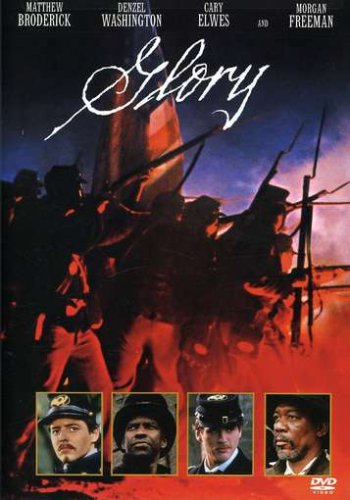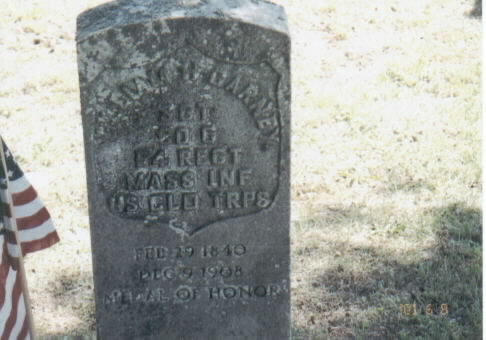Remembering Sergeant Carney
 One hundred and eighteen years ago today—May 23, 1900—William H. Carney received the Medal of Honor for actions in July 1863 during the Civil War. President William McKinley, who issued the Medal in the name of Congress (hence the oft-used misnomer “Congressional Medal of Honor”) was himself a Civil War veteran, having enlisted in the 23rd Ohio as a private in the war’s early days and rising to the rank of major by war’s end. Hundreds of Medals of Honor were awarded to Civil War soldiers in the decades after the war. In fact, some of the Civil War’s most famous recipients of the Medal did not receive it until many years later. For example, Daniel E. Sickles and Joshua L. Chamberlain both received the award for actions at the July 1-3, 1863 battle of Gettysburg. But Chamberlain did not receive the award until 1893, and Sickles waited until 1897 for his.
One hundred and eighteen years ago today—May 23, 1900—William H. Carney received the Medal of Honor for actions in July 1863 during the Civil War. President William McKinley, who issued the Medal in the name of Congress (hence the oft-used misnomer “Congressional Medal of Honor”) was himself a Civil War veteran, having enlisted in the 23rd Ohio as a private in the war’s early days and rising to the rank of major by war’s end. Hundreds of Medals of Honor were awarded to Civil War soldiers in the decades after the war. In fact, some of the Civil War’s most famous recipients of the Medal did not receive it until many years later. For example, Daniel E. Sickles and Joshua L. Chamberlain both received the award for actions at the July 1-3, 1863 battle of Gettysburg. But Chamberlain did not receive the award until 1893, and Sickles waited until 1897 for his.
So Carney receiving his award decades after his action was not at all unusual. What was somewhat out of the ordinary, though, was that Carney was African American. In fact, because his action preceded those of other Medal of Honor recipients, Carney is considered the first African American to receive the nation’s highest award for military valor.
William Carney was born into slavery in Norfolk, Virginia in February 1840. It is not entirely clear how he escaped slavery, but most think he used the Underground Railroad to make his way to Massachusetts. His father was already there, and other family members who purchased their own freedom or became free upon the death of their owner soon joined them in the North.
President Abraham Lincoln issued the Emancipation Proclamation on January 1, 1863, and among other things the proclamation allowed African Americans to be recruited to fight for the Union as soldiers and sailors. Probably the most famous all-black unit was the 54th Massachusetts, whose exploits were the subject of the popular 1989 Hollywood film Glory. Carney enlisted in the 54th in March 1863.
On July 18, 1863, the 54th Massachusetts led the assault on Fort Wagner in Charleston Harbor, South Carolina (the attack depicted in Glory’s climactic scene). As the regiment advanced, the color sergeant went down and Carney scooped up the colors. He continued to advance despite being wounded several times, eventually planting the flag on Fort Wagner’s parapet. Ultimately, though, the attack did not succeed, and the 54th Massachusetts was forced to withdraw. Sergeant Carney carried the colors back to the safety of Union lines. Weak from his wounds and blood loss, Carney turned the flag over to another soldier of the 54th, supposedly telling him, “Boys, I did my duty; the old flag never touched the ground.”

Carney survived but was discharged due to his wounds in June 1864. He returned to his adopted hometown of New Bedford, Massachusetts and worked for a time maintaining the city’s streetlights and then for thirty-two years as a postal worker. He married and had a daughter and became well-known in Massachusetts for telling the story of the Fort Wagner assault to schoolchildren. He always ended his presentations with his now-famous phrase “The old flag never touched the ground.”
The Medal of Honor citation Carney received on this day 118 years ago reads as follows: “When the color sergeant was shot down, this soldier grasped the flag, led the way to the parapet, and planted the colors thereon. When the troops fell back he brought off the flag, under a fierce fire in which he was twice severely wounded.”
William H. Carney died at age 68 on December 9, 1908 following an elevator accident. He is interred in his family’s plot in New Bedford’s Oak Grove Cemetery. He received a Medal of Honor tombstone from the federal government.

Sergeant William H. Carney served his country nobly and deserves recognition not only as the first African American to perform an action deemed worthy of the Medal of Honor, but, simply, as a veteran. Though he did not die in battle, he is still worthy of remembrance this coming Memorial Day weekend. That he and nearly 200,000 other African Americans volunteered to fight for the Union demonstrates not only their own courage, but also the truly personal stake each of them had in the outcome of the Civil War.
I am really enjoying reading about these little-known individuals. Memorial Day is a day for remembrance, and these folks are worth remembering. Thank you.
A couple years ago Norfolk created a trail on the waterfront honoring all 12 Medal of Honor recipients connected with the city. Carney is among them.